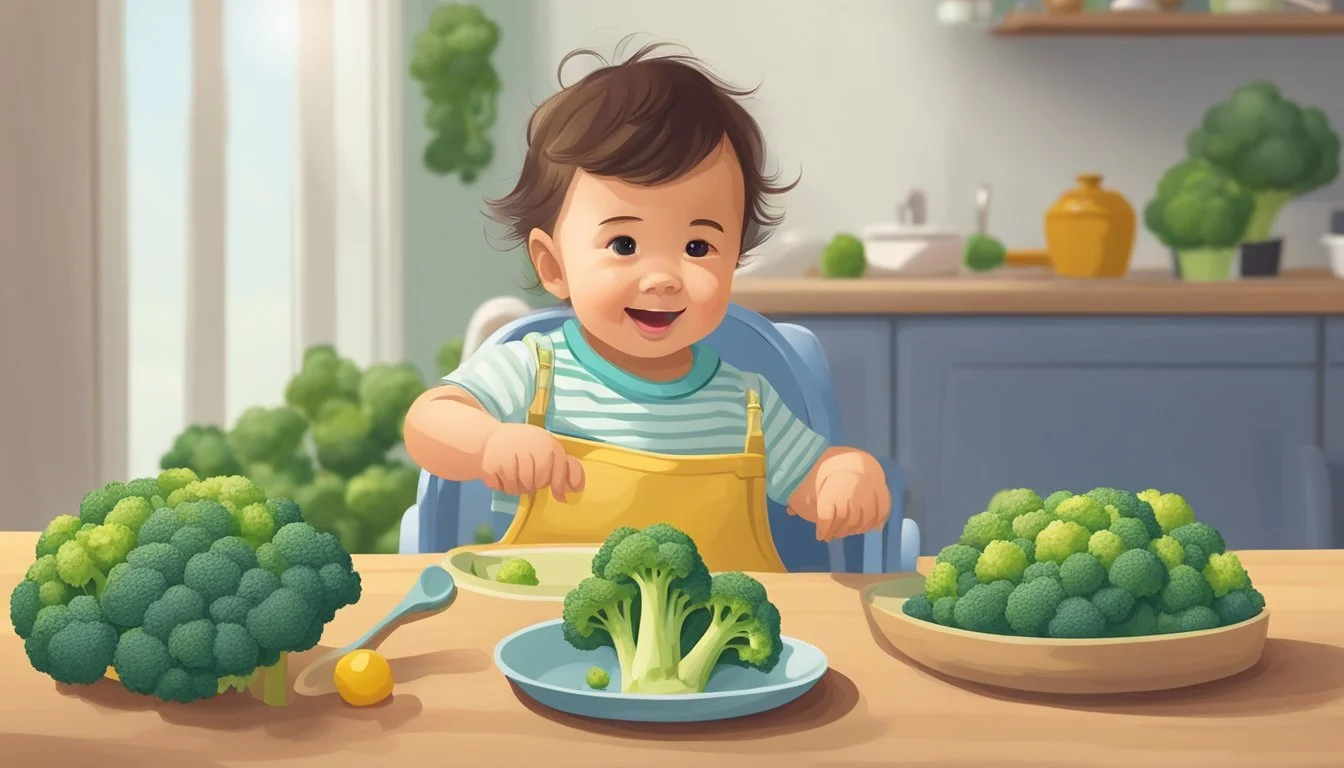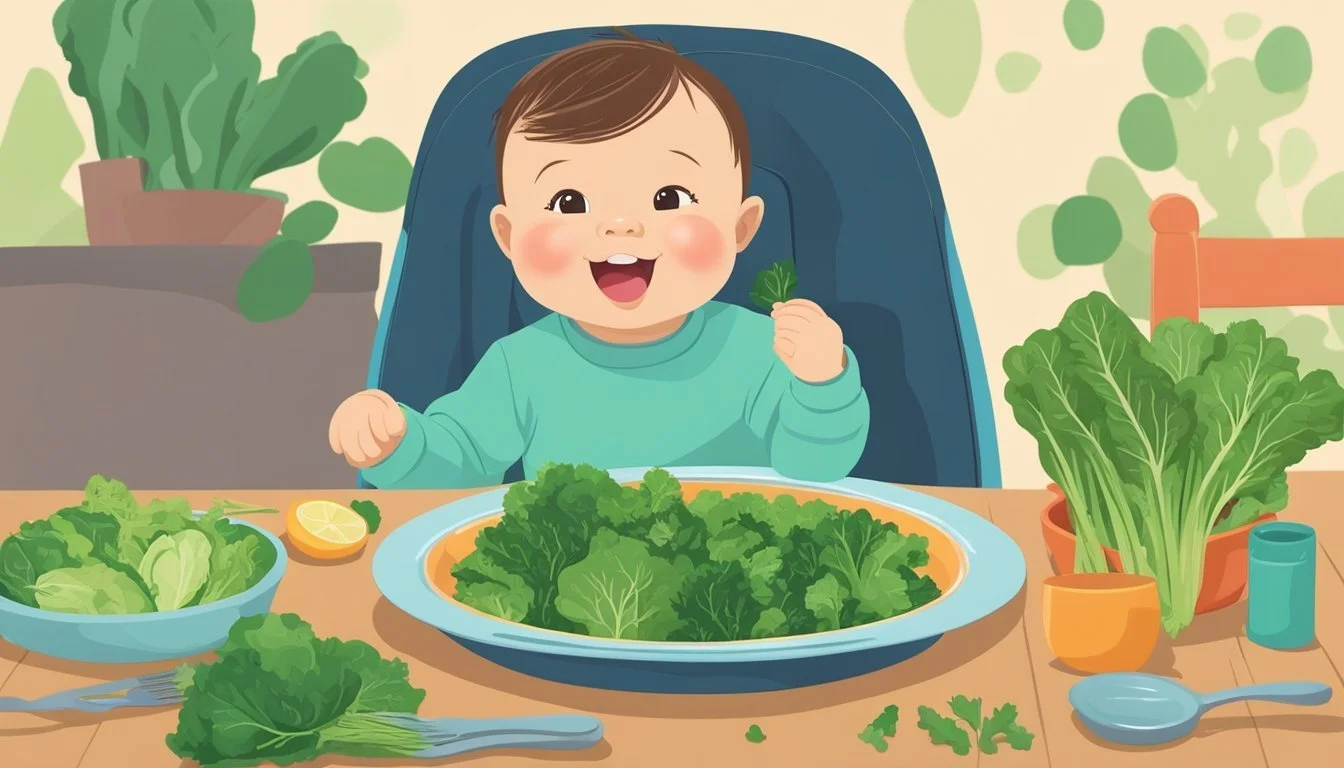Gentle Relief: Best Foods to Help Your 12-Month-Old Overcome Constipation
Constipation can be a common issue for 12-month-old babies as they transition to more solid foods. Parents often seek effective and gentle ways to alleviate this discomfort. Exploring dietary options tailored for toddlers can provide much-needed relief and promote healthy digestion.
Incorporating specific foods into a baby's diet can help relieve constipation and support regular bowel movements. This article will provide valuable insights into which foods to choose and how they can benefit a baby's digestive health, ensuring they stay comfortable and happy.
1) Prunes
Prunes are a highly effective remedy for constipation in 12-month-old babies. They contain a high level of fiber, which is essential for promoting healthy bowel movements.
Prunes are also rich in sorbitol, a natural sugar alcohol that acts as a gentle laxative. This helps to soften the stool and ease its passage.
Parents can serve prunes in various forms, such as puree or juice. It is important to ensure the prunes are pitted and blended smoothly for ease of consumption.
When preparing prune puree, soaking the prunes in hot water for about 10 minutes makes them easier to blend. This method retains the prunes' natural nutrients.
Adding small amounts of prune juice to the baby’s diet can also help. It is recommended to start with small servings and observe the baby’s reaction to prevent any discomfort.
Prunes can be mixed with other fruits like pears or apples to make the taste more appealing. This combination can provide additional fiber and nutrients.
Ensuring the right portion size is crucial. Overconsumption of prunes can lead to diarrhea. A balanced amount aids in effective digestion without causing digestive stress.
2) Pears
Pears are an excellent choice for helping relieve constipation in 12-month-olds. They are high in dietary fiber, especially pectin, which helps to improve bowel movements.
Parents can offer pears in various forms. Raw pears can be peeled, cored, and cut into small, manageable pieces. Alternatively, stewed or pureed pears provide a softer texture that is often easier for young children to handle.
When preparing pureed pears, steaming or baking can enhance their natural sweetness while retaining their fiber content. For added hydration, pear juice can be given in moderation, which can help soften stools.
Pears also contain a good amount of water, which helps to keep the baby hydrated. Hydration is crucial for preventing and managing constipation, as it helps to soften stools and promote regular bowel movements.
3) Peaches
Peaches are a natural remedy for constipation in babies. They are rich in fiber, which aids in regulating the digestive system. Soluble fiber in peaches helps soften stool, making it easier to pass.
Peaches are also high in water content. Hydration is crucial for easing constipation, and juicy fruits like peaches can contribute to fluid intake.
Peaches can be easily integrated into a baby's diet. They can be pureed, mashed, or served in small, manageable pieces for older infants. Peeling the skin may be necessary to avoid choking hazards and make digestion easier for a 12-month-old.
4) Plums
Plums are a natural remedy for constipation in 12-month-olds. They are high in dietary fiber, which promotes bowel regularity. The fiber helps to soften the stool and makes it easier to pass.
The natural sweetness of plums makes them appealing to babies. They can be served fresh, cooked, or as a puree. Removing the skin and seeds ensures a smoother texture for young children.
In addition to fiber, plums contain sorbitol, a natural sugar alcohol that acts as a gentle laxative. This can help to stimulate bowel movements and alleviate constipation.
Parents can introduce plums gradually into their child's diet. Starting with small portions can help to gauge the baby's response and ensure there are no allergic reactions. Always consult a pediatrician before making significant changes to a baby's diet.
5) Apricots
Apricots are a nutritious fruit that can help relieve constipation in 12-month-old babies. Rich in dietary fiber, apricots aid digestion by adding bulk to the stool, which facilitates easier bowel movements.
Incorporating fresh or dried apricots into a baby’s diet provides a natural source of sorbitol. Sorbitol is a sugar alcohol that draws water into the intestines, softening the stool.
It's important to ensure apricots are properly prepared for young children. For fresh apricots, peeling and mashing the fruit can make it easier to consume. When using dried apricots, rehydrating them in water can make them softer and safer to eat.
Apricot puree can be an excellent option, either on its own or mixed with other fruits like pears or apples. This combination provides a variety of flavors while helping to relieve constipation.
Apricots also offer essential vitamins and minerals such as Vitamin A, which supports overall health. Serving apricots regularly, while maintaining a balanced diet, can be beneficial for a baby experiencing constipation.
6) Broccoli
Broccoli is a fantastic food to help a 12-month-old with constipation. It's rich in dietary fiber, which is essential for promoting healthy bowel movements. The fiber in broccoli adds bulk to the stool and helps it move more smoothly through the digestive tract.
Broccoli also contains a good amount of water, which helps to keep the stools soft and easier to pass. Steamed broccoli florets can be a great finger food for toddlers, making it easy for them to pick up and eat.
For parents looking to introduce broccoli, it's important to ensure it's cooked well to avoid any choking hazards. Lightly steamed or cooked until soft, broccoli retains most of its nutrients and becomes easier for babies to digest.
Introducing small portions of broccoli regularly can aid in preventing constipation. It's also a versatile vegetable that can be added to purees, mixed with other vegetables, or served as small, bite-sized pieces.
7) Brussels Sprouts
Brussels sprouts can be a beneficial addition to a 12-month-old's diet to help alleviate constipation. These small, cabbage-like vegetables are packed with dietary fiber, which promotes healthy digestion and regular bowel movements.
A serving of just five Brussels sprouts contains approximately 3.5 grams of fiber, a significant amount for a young child.
At 12 months, babies can handle different textures and flavors. Offer these veggies in bite-sized pieces, making sure they are soft enough for your child to chew and swallow safely.
Preparing Brussels sprouts can be simple. Steaming or roasting until tender can make them more palatable for young children. Alternatively, you can mash them slightly to make consumption easier.
Incorporating Brussels sprouts regularly can support your child's digestive health and reduce constipation. Always introduce new foods gradually and observe any reactions or changes in bowel habits.
8) Sweet Potatoes
Sweet potatoes are an excellent choice for alleviating constipation in a 12-month-old. Rich in dietary fiber, they help promote healthy bowel movements. The fiber content aids in softening the stool, making it easier to pass.
Preparing sweet potatoes is simple and versatile. They can be baked, boiled, or steamed and then mashed or pureed to suit your baby's preference.
Combining sweet potatoes with other fiber-rich foods like white beans can enhance their effectiveness. For instance, mixing cooked sweet potato with mashed beans creates a nutritious, constipating-relief dish.
The natural sweetness of sweet potatoes also makes them appealing to young children. This ensures that they are more likely to enjoy and accept this beneficial food.
In addition to fiber, sweet potatoes offer essential vitamins and minerals like vitamin A, which supports overall growth and development.
Overall, incorporating sweet potatoes into your child's diet can be a tasty way to help with regularity and promote digestive health.
9) Leafy Greens
Leafy greens are an excellent option for helping relieve constipation in 12-month-old children. These vegetables are rich in fibers, which can promote regular bowel movements and aid in digestive health.
Spinach, kale, arugula, and lettuce are common leafy greens that can easily be incorporated into a toddler's diet.
Including these greens in meals can be as simple as blending spinach into a smoothie, adding kale to soups, or lightly steaming and finely chopping greens to mix into other dishes.
Leafy greens are also packed with water, which helps to soften stool and prevent dehydration – both critical factors in preventing constipation.
Parents should introduce these greens gradually into their child’s diet to avoid overwhelming their digestive system.
Choosing organic options when possible can help reduce pesticide exposure, which is particularly important for young children.
Light cooking can make leafy greens easier for a toddler to chew and digest. Balancing these greens with other fiber-rich foods can provide a comprehensive approach to managing constipation effectively.
10) Chia Seeds
Chia seeds are a highly effective food to combat constipation in 12-month-old children. They contain a significant amount of fiber, which plays a crucial role in promoting healthy digestion. Two tablespoons of chia seeds provide around 7 grams of fiber, mostly soluble, which helps soften stools and ease bowel movements.
To introduce chia seeds safely, soak them in water for about 30 minutes before serving. This reduces the risk of the seeds clumping together and ensures they are easier to digest. Soaking chia seeds helps them absorb water, making them bulky and soft, which aids in alleviating constipation.
Incorporating chia seeds into a toddler's diet can be simple. They can be mixed into yogurt, oatmeal, or even smoothies. It's important to avoid giving spoonfuls of dry chia seeds directly, as they can absorb moisture and cause discomfort.
Ensuring adequate water intake is essential when feeding children chia seeds. The seeds absorb liquid, and increasing water consumption helps prevent any potential bloating or hard stools. A balanced approach, combining chia seeds with other high-fiber foods and sufficient hydration, can support regular bowel movements in toddlers.
11) Flax Seeds
Flax seeds are a nutritious option for alleviating constipation in 12-month-old babies. Rich in fiber, these seeds help to bulk up the stool, making it easier to pass.
Ground flax seeds can be added to a variety of foods. For example, mixing a small amount into oatmeal or yogurt provides both flavor and health benefits. Start with a tiny amount and gradually increase the quantity as the child adjusts.
Another benefit of flax seeds is their omega-3 fatty acid content, which supports overall health. These healthy fats contribute to brain development and can be an essential part of a balanced diet.
When preparing flax seeds for young children, it’s important to grind them into a fine powder. Whole seeds may pose a choking risk and are difficult to digest. Store ground flax seeds in the refrigerator to maintain freshness and nutritional value.
To rehydrate the seeds and make them easier to digest, you can soak them in water before adding them to meals. This makes the seeds swell and adds a gel-like consistency that can further aid digestion.
By incorporating flax seeds into their diet, parents can offer a simple and effective remedy to help relieve constipation in their 12-month-old child.
12) Oatmeal
Oatmeal is a beneficial food choice for relieving constipation in 12-month-old children. Rich in dietary fiber, it helps to promote regular bowel movements. A serving of 100 grams of oatmeal can contain approximately 10.1 grams of total dietary fiber.
The soluble fiber in oatmeal dissolves in water, forming a gel-like substance, which can ease the passage of stool through the digestive tract. This can help to alleviate constipation effectively.
Introducing oatmeal into a child’s diet can be simple and versatile. It can be prepared with water or milk and mixed with fruits such as apples or pears, which are also known to aid digestion.
Offering oatmeal regularly can be a natural and gentle way to support digestive health. Moreover, it is a nutritious option providing essential vitamins and minerals, contributing to overall well-being.
Understanding Constipation in 12-Month-Olds
Constipation in 12-month-olds can occur due to various factors, including dietary choices and underlying health conditions. Identifying the signs and symptoms is crucial for timely and effective management.
Common Causes
One common cause of constipation in 12-month-olds is insufficient fiber intake. A diet low in fruits, vegetables, and whole grains can lead to harder stools. Additionally, lack of fluids is a significant contributor. Toddlers need adequate water to help soften stool and promote regular bowel movements.
Certain medications and health conditions like celiac disease or diabetes can also cause constipation in toddlers. Sometimes, sudden changes in diet or transitions from breast milk to formula can disrupt normal bowel patterns. Other factors might include low physical activity and the development of fear or anxiety around using the toilet.
Signs and Symptoms
Parents should watch for signs like less than three bowel movements per week, which can indicate constipation. Hard, dry, and difficult-to-pass stools are another hallmark. A toddler may also show distress or pain while trying to have a bowel movement, exhibiting cries or strain during the process.
Other symptoms include stomach pain and discomfort, which might make them irritable or less active. There might be traces of liquid or pasty stool in the child's underwear, a condition known as encopresis, indicating that stool is backed up in the rectum. Recognizing these signs helps in addressing the issue promptly and seeking medical advice if necessary.
Dietary Adjustments to Alleviate Constipation
Adjusting a 12-month-old's diet can significantly help in easing constipation. Key dietary changes include increasing fiber intake, maintaining proper hydration, and incorporating probiotics to support gut health.
Increasing Fiber Intake
A high-fiber diet is crucial for effective bowel movements. Foods rich in soluble and insoluble fiber help to bulk up stools and make them easier to pass. For a 12-month-old, introducing pureed apples, pears, and plums can be beneficial. Whole grains like oatmeal and barley, as well as pulses such as lentils, are excellent choices.
It's important to introduce fiber gradually to avoid any digestive discomfort. Always ensure the foods are in a form easily manageable by a child, such as finely chopped or pureed.
Hydration and Fluids
Proper hydration is essential to help fiber work effectively. Water helps to soften stools, making them easier to pass. Offering small amounts of water throughout the day, in addition to regular breast milk or formula, can help keep a child well-hydrated.
Juices rich in sorbitol, such as apple, pear, or prune juice, can also be introduced in very small amounts. Sorbitol acts as a natural laxative, promoting easier bowel movements. Always consult with a pediatrician before making significant changes.
Probiotics and Gut Health
Probiotics play a vital role in maintaining a healthy digestive system. Foods like yogurt that contain live, active cultures can help improve gut health by increasing the population of good bacteria.
For a 12-month-old, yogurt can be a safe and effective option. Choose plain yogurt without added sugars.
Incorporating small amounts of fermented foods, like kefir, is another option, though it's crucial to introduce these gradually and monitor for any adverse reactions. Always ensure the foods are age-appropriate and consult a healthcare provider if in doubt.











